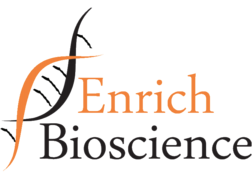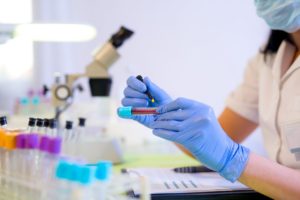Non-invasive genetic testing for multiple cancers
Current cancer detection methods can capture only one cancer at a time. Cancer, when detected early, has more therapeutic options and results in higher survival rates. However, with no symptoms, it is difficult to screen for cancer. There is an unmet need to develop a single test that can screen any cancer type before symptoms appear.

Cancer
Globally, cancer is the leading cause of death. Every second person (49% of men and 45% of women) is expected to develop cancer during their lifetime, and every fourth person (28% of men and 24% of women) is expected to die from cancer. Early detection is the key to improving survival rates by as much as 20% to 50%.
Unfortunately, the current detection methods rely on indicators such as symptoms and risk factors- smoking, family history or age- before further testing is done.
This is often too late.
Liquid biopsy and DNA methylation
Enrich Bioscience is leveraging DNA methylation science and its close relationship with cancer to develop a panel of cancer biomarkers. DNA methylation tools allow the detection of cancerous DNA from a sea of healthy cells, a scenario anticipated in a non-invasive blood sample of a patient.
Challenges of cancer detection
The key to managing cancer is early detection in non-invasive samples with a multi-biomarker approach.
Technological Challenges:
- Multi-targeted analysis of biomarkers in a single reaction causes random amplification, which compromises accuracy.
- Solid-organ cancer DNA is released into the circulating blood in minute amounts.
- Solid-organ cancer DNA in the blood is fragmented, which is difficult to capture and analyze.
Biological Challenge:
Cancer is heterogeneous, and its profile changes with stage- and treatment type.
One test for multiple cancers.
A multi-biomarker test on non-invasive samples allows for numerous benefits for patients.
Early diagnosis – Early detection is crucial to increase successful treatment chances, making more options available, including surgery and chemotherapy.
Differentiation of cancer types – Multiple biomarkers increases the sensitivity and specificity of the test. Analyzing non-invasive sample material, which is limited in amount, may result in high false negatives for a single biomarker. On the contrary, a few biomarkers, such as PSA testing for prostate cancer detection, are sensitive and non-specific, resulting in high false-positive for cancer detection. What is required is a test that is highly sensitive and is also highly specific.
Multiple studies have shown that DNA methylation biomarkers improve specificity to differentiate among different cancer types and detect cancer at an earlier stage such as stage I or II.
Therapeutic options – patterns of biomarkers will predict treatment options.


